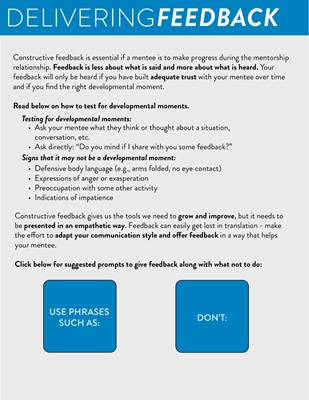
11
Capri Mentorship Program: Mentor Toolkit
DELIVERINGFEEDBACK
Constructive feedback is essential if a mentee is to make progress during the mentorship
relationship. Feedback is less about what is said and more about what is heard. Your
feedback will only be heard if you have built adequate trust with your mentee over time and
if you find the right developmental moment. Read below on how to test for developmental
moments.
Constructive feedback gives us the tools we need to grow and improve, but it needs to
be presented in an empathetic way. Feedback can easily get lost in translation - make
the effort to adapt your communication style and offer feedback in a way that helps your
mentee. Read below for suggested prompts to give feedback along with what not to do:
• Ask your mentee what they think or thought about a situation,
conversation, etc.
• Ask directly: "Do you mind if I share with you some feedback?"
• How would you do this differently?
• I think you did very well there but to
take it to the next level
• You clearly put a lot of time into this…
• I want to challenge your thinking on
this…
• Let's go back to the goal we started
with…
• Do you want to take this feedback and
try again?
• What motivated you to do this?
• What have the others said so far?
• Be vague.
• Expect them to diagnose problems on their
own.
• Be too rigid in the expected results.
• Require them to provide their own next
steps.
• Discourage their creativity.
• Ask for all of their reasons for doing
something.
• Use competition as a motivator to improve.
• Use an overly serious tone.
• Be too intense in your critique.
• Lose focus when they explain their thinking.
• Make things personal rather than objective.
• Be open-ended with your opinions.
• Defensive body language (e.g., arms folded, no eye contact)
• Expressions of anger or exasperation
• Preoccupation with some other activity
• Indications of impatience
Testing for developmental moments:
Use phrases such as: Don't:
Signs that it may not be a developmental moment: